
Is your Little One Ready for Solids?
"One of my favorite things to blog about is baby nutrition. I feel very strongly that the food babies eat will affect their health in the future. When we feed our children healthy foods, they are more likely to make healthy choices for themselves later on is life as well! According to Health Canada, breastmilk and formula should be the only food given to infants under six months. Personally, I decided to start giving Aimery baby food when he was four months old because I felt he was ready and he was literally taking the food off of our plates! Every baby is different, some babies are ready for solids at 4 months and others aren't ready until 7 months!
At Amara, we recommend starting at 6+ months but as Summer says, every baby is different. You know your little one the best and follow your pediatrician's recommendations on when your baby is ready to start eating solids.
Developmental signs of readiness
The best way to know if your baby is ready for solids is by following their developmental signs! Cues to look for include:
- Head control
- Sitting well when supported
- Doubled their birth weight
- Become curious about food
By looking out for these developmental signs, you will have a decent idea of when to start your little one on solids. Every infant is different, so start your baby on solids whenever you think your little one is ready. If you have any questions you should always speak with your child's pediatrician.
Don't begin with Rice
When you start your baby on solids, your baby's main food source should still be breastmilk/formula. Solids should be given in addition to milk. Many parents know that most pediatricians recommend giving rice cereal as a first food, and then continuing with pureed fruit and starchy vegetable purees. This is what I did with my first baby because I honestly didn't know any better at the time. It turns out that beginning with cereal is an American concept that is not practiced in many parts of the world (including countries like Canada with lower rates of obesity). This is a popular first food because babies begin to need supplemented nutrients such as iron around 6 months and it is easy for Americans to give their babies iron-fortified processed foods instead of REAL food with high levels of iron. But why wouldn't we just give our little ones foods that are high in iron instead of processed cereal?
This is really important, moms you have everything you need to give your baby the nutrients they need. When you start introducing solids, you want your baby to get to know different tastes and textures. That's why you need them to get the closest thing to the real fruits and vegetables (not highly processed purees). Now, we know that a lot of you already have enough on your plate without worrying about chopping, steaming and pureeing fruits and veggies. It's one of the main reasons we started Amara ;)

The best first foods
Although giving your little one foods with iron isn't necessarily easier than handing over a bottle with cereal, the best way to get iron into your baby's diet is by adding foods with high iron intake such as:
- Beef
- Lamb
- Game
- Poultry
- Fish (due to allergy concerns, pediatricians advise waiting to give shellfish until after the first year)
Our family doesn't eat very much meat, so some great vegetarian options are :
- Egg Yolks (due to allergy concerns, pediatricians advise waiting to give egg whites until after the first year)
- Beans
- Lentils
- Avocados

Introducing fruits + vegetables
Fruit and vegetable purees are great to add to your baby's diet in addition to other traditional high-iron foods. My favorite baby food company, Amara Organic Food, has made feeding your little one easier by creating an on-the-go solution to feeding your baby organically. Amara Organic Food uses a unique technology to lock in the original nutrients your little one needs, unlike many of the processed baby foods you buy at the grocery store. To read more about the hidden truth behind store bought baby food, click here.
Amara Organic Food offers a great substitute for homemade meals while on the go. They have five different flavors with puree and textured options. Their flavors include:
- Banana : 6+ Months (Puree)
- Tropical Mango : 6+ Months (Puree)
- Potato and Kale Mash : 6+ Months (Textured)
- Apple-Maqui Berry : 7+ Months (Textured)
- Oats n' Berries : 8+ Months (Textured)

What's Next?
After introducing solids, start at once a day and then begin to increase servings to 3 times a day. An easy way to monitor the number of solid servings your baby is getting is to give your little ones solids at family mealtimes. By their first birthday, your infant should be on a regular schedule of eating solids that include the following servings daily:
- Fruit - 1-2 servings
- Vegetables: 2-4 servings
- Grains (or starchy vegetables): 3-6 servings
- Meats (or high iron substitute): 1 serving
- Dairy (full-fat for children under 2): 2 servings
Our PhD in nutrition at Amara always reminds parents that even if your baby doesn't love the fruits and vegetables at first, keep trying little portions. Sometimes, it just takes your little one some time to get used to the new tastes and textures!
Providing the right nutrition to your little one shouldn't be difficult! Giving your baby solids at family mealtimes is the best way to ensure that your infant is eating enough servings throughout the day. Start off slowly and watch your little ones reactions to food! Good luck on your journey to introducing solids to your little one.
This post is in collaboration with Amara Organic Food.
For the original version, or to check out one of our favorite mommy bloggers - check out Being Summer Lewis here.
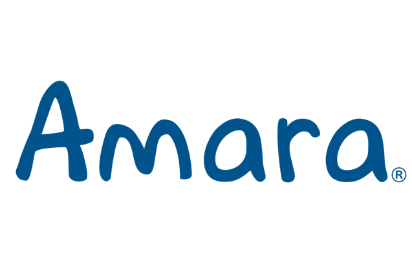
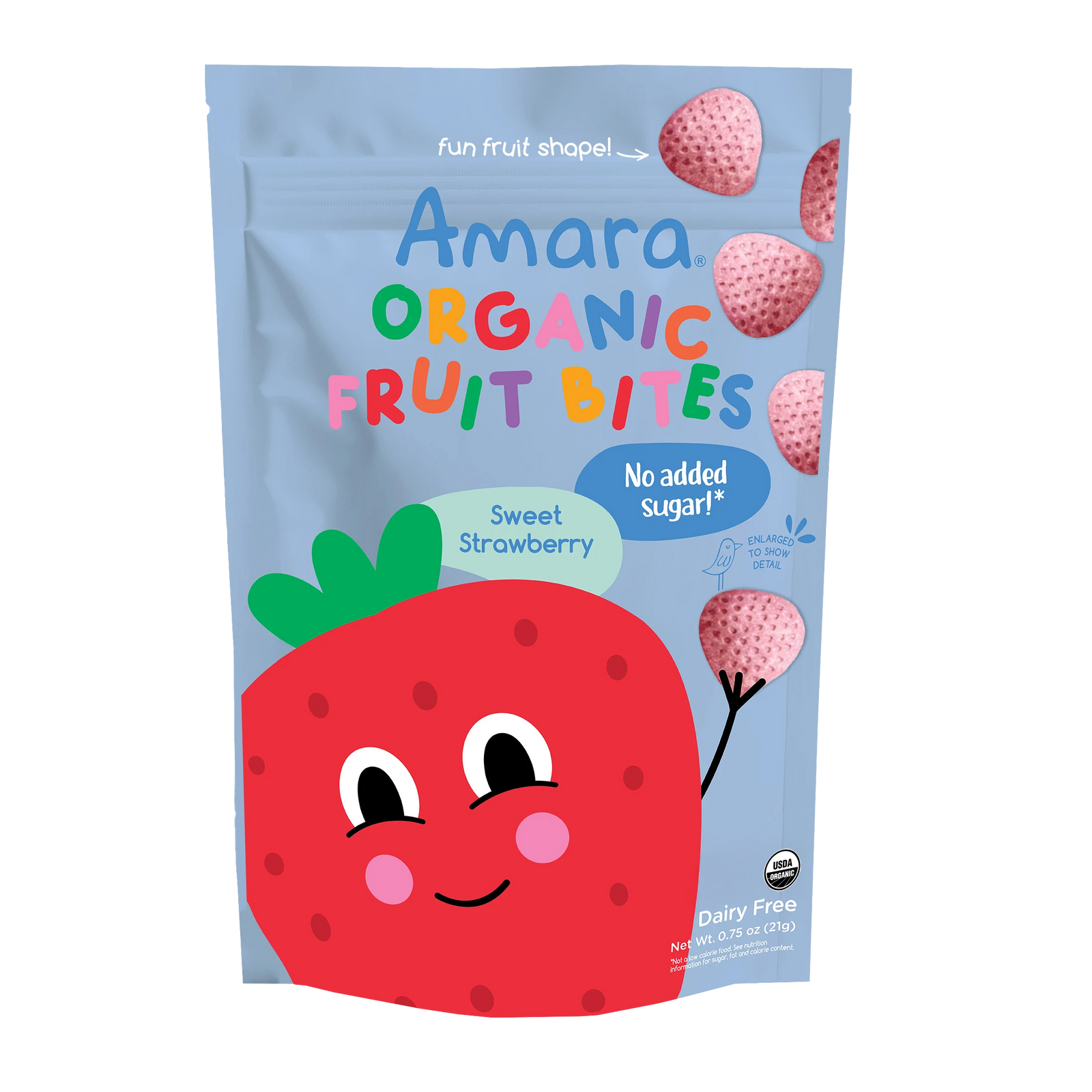


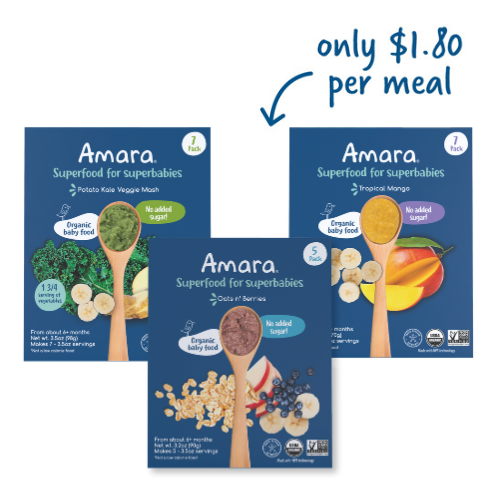
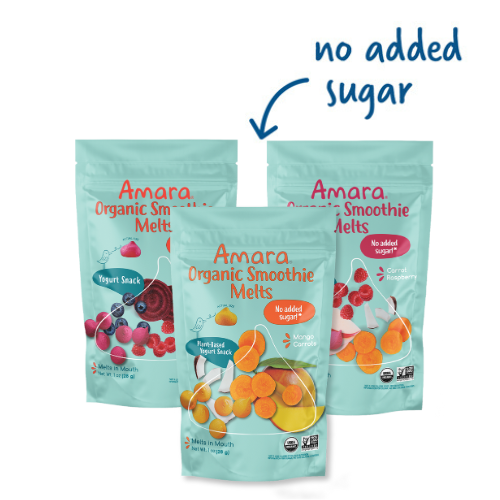
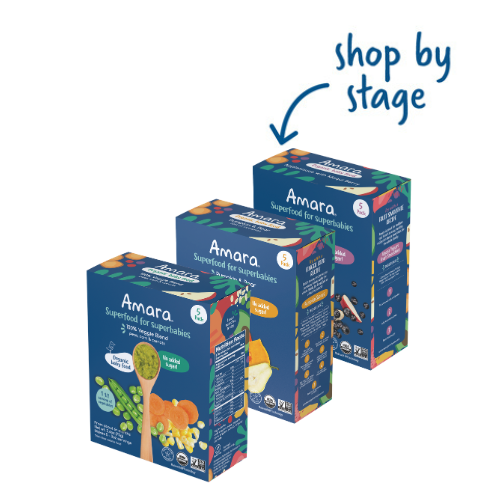
Leave A Comment